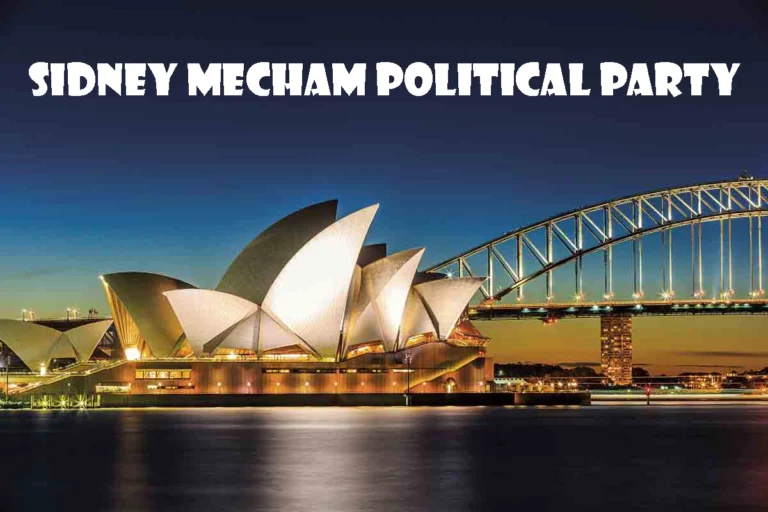Sidney Mecham Political Party affiliation has been a subject of significant interest and speculation in the political sphere. As a pivotal figure in the realm of politics, understanding Mecham’s alignment with a particular party is crucial for dissecting his ideologies, policies, and actions. Mecham’s association with a specific political party serves as a foundational aspect in comprehending his role within the broader political landscape. This introduction sets the stage for a detailed examination of Sidney Mecham Political Party affiliation, aiming to unravel its implications and significance.
II. Understanding Sidney Mecham Political Party
Sidney Mecham Political Party affiliation is emblematic of his broader ideological stance and his place within the political spectrum. Mecham’s political ideology is shaped by a combination of personal beliefs, experiences, and the socio-political environment in which he operates. Understanding Mecham’s political ideology provides insights into his policy preferences, decision-making processes, and overall approach to governance.
III. Factors Influencing Party Affiliation
Party affiliation is a complex decision influenced by a variety of factors. Understanding these factors is crucial in comprehending why individuals like Sidney Mecham align themselves with specific political parties. Examining personal beliefs and values and the socio-political environment provides valuable insights into the motivations behind party affiliation.
Personal beliefs and values:
Personal beliefs and values are foundational in shaping an individual’s political identity and party affiliation. For Sidney Mecham, these beliefs and values are likely deeply rooted in his upbringing, education, and life experiences. Mecham’s moral principles, ethical considerations, and ideological convictions all contribute to his alignment with a particular political party. Whether it’s a commitment to social justice, economic equality, or individual liberty, Mecham’s personal beliefs guide him toward a party whose platform resonates with his values.
Socio-political environment:
The socio-political environment plays a pivotal role in shaping party affiliation decisions for individuals like Sidney Mecham. Mecham’s political choices are influenced by the broader societal context, including cultural norms, historical events, and prevailing ideologies. Economic conditions, social movements, and technological advancements all contribute to the evolving landscape in which Mecham navigates. Moreover, the strategies and messaging employed by political parties, as well as their interactions with the media and public discourse, influence Mecham’s perception of their credibility and relevance.
Mecham’s party affiliation may also be influenced by the perceived effectiveness of political parties in addressing pressing issues and advancing policy agendas within the current socio-political climate. Overall, the socio-political environment provides the contextual backdrop against which Mecham evaluates his alignment with a particular party.
IV. Impact of Sidney Mecham’s Party Affiliation
Understanding the impact of Sidney Mecham’s party affiliation requires a nuanced examination of how his alignment with a particular political party shapes various aspects of his political career and the broader political landscape. Mecham’s party affiliation influences policy decisions and defines his role within the political arena, thereby impacting governance and public discourse.
Influence on policy decisions:
Sidney Mecham’s party affiliation significantly influences the policy decisions he makes as a political figure. As a member of a specific political party, Mecham is likely to advocate for and support policies that align with the party’s platform and ideological priorities. This alignment guides Mecham’s voting behavior, legislative proposals, and policy advocacy efforts.
Moreover, Mecham’s party affiliation may grant him access to party resources, networks, and leadership positions, enhancing his ability to shape policy outcomes. However, Mecham’s adherence to party principles may also limit his flexibility in negotiating bipartisan solutions or deviating from party orthodoxy on certain issues. Overall, Mecham’s party affiliation plays a central role in determining the direction and content of the policies he champions as a political leader.
Role within the political landscape:
Sidney Mecham’s party affiliation defines his role within the broader political landscape, shaping his relationships with other political actors and institutions. As a member of a specific political party, Mecham is part of a larger ideological bloc with shared goals and objectives. This affiliation influences Mecham’s alliances, coalitions, and rivalries within the political arena. Mecham’s party affiliation may also determine his standing within the party hierarchy, influencing his access to leadership positions, committee assignments, and opportunities for political advancement.
Moreover, Mecham’s party affiliation informs his interactions with constituents, interest groups, and the media, as perceptions of party loyalty and consistency often shape public opinion. However, Mecham’s party affiliation may also subject him to criticism and scrutiny from opposing parties and interest groups, particularly if his actions are perceived as diverging from party norms or principles. Overall, Mecham’s party affiliation shapes his role as a political actor and his influence within the broader political landscape.
V. Critiques and Controversies Surrounding Mecham’s Party Affiliation
Sidney Mecham’s party affiliation has not been without its share of critiques and controversies, with opposition perspectives and media portrayal often playing a significant role in shaping public perception and discourse surrounding his political allegiance. Understanding these critiques and controversies provides valuable insights into the complexities of Mecham’s party affiliation and its implications.
Opposition perspectives:
Critiques of Sidney Mecham’s party affiliation often come from opposition parties and rival political factions. Opponents may accuse Mecham of aligning with a party that espouses policies or ideologies they vehemently oppose. They may argue that Mecham’s affiliation with a particular party undermines his credibility as a representative of all constituents or accuse him of prioritizing partisan interests over the common good.
Furthermore, opposition perspectives on Mecham’s party affiliation may highlight instances where his actions or statements contradict the values or platform of his affiliated party, leading to accusations of inconsistency or opportunism. Overall, opposition perspectives provide a critical lens through which Mecham’s party affiliation is scrutinized and contested within the political arena.
Media portrayal:
Media portrayal plays a crucial role in shaping public perceptions of Sidney Mecham’s party affiliation. News outlets, commentators, and pundits may frame Mecham’s affiliation with a particular party in various ways, depending on their political leanings and editorial agendas. Positive media coverage may portray Mecham’s party affiliation as a sign of principled leadership, highlighting his alignment with policies or values that resonate with a significant portion of the electorate.
Conversely, negative media portrayal may focus on perceived shortcomings or controversies related to Mecham’s party affiliation, amplifying criticisms from opposition perspectives and casting doubt on his political judgment or integrity.
VI. Sidney Mecham Political Party: Future Implications
Exploring the future implications of Sidney Mecham’s party affiliation involves examining potential shifts in allegiance and the long-term effects on his political career. As Mecham continues his journey in the political arena, understanding these implications provides valuable insights into the trajectory of his political influence and legacy.
Potential shifts in party allegiance:
The possibility of Sidney Mecham undergoing shifts in party allegiance raises questions about the factors that could prompt such changes and the implications for his political identity and alliances. Mecham’s evolving personal beliefs, changing political landscape, or strategic considerations may contribute to potential shifts in his party affiliation. These shifts could signal broader ideological realignments within the political sphere or reflect Mecham’s efforts to adapt to shifting public sentiments or electoral dynamics.
Moreover, potential shifts in Mecham’s party allegiance may impact intra-party dynamics and coalition-building efforts, reshaping the balance of power within the political arena. Overall, examining the potential for shifts in Mecham’s party allegiance offers insights into the fluid nature of political alliances and the complexities of navigating partisan politics.
Long-term effects on political career:
The long-term effects of Sidney Mecham’s party affiliation extend beyond immediate policy outcomes to shape the trajectory of his political career and legacy. Mecham’s alignment with a particular party influences his standing within the party hierarchy, his relationships with key stakeholders, and his prospects for future leadership roles.
VII. Conclusion
In conclusion, Sidney Mecham Political Party affiliation serves as a pivotal aspect of his political identity and influence. Through an exploration of Mecham’s alignment with a particular party, we gain valuable insights into his ideological framework, policy priorities, and role within the political landscape. Mecham’s party affiliation shapes his alliances, policy decisions, and public image, influencing both his effectiveness as a political leader and his standing within the broader community.
Moreover, critiques, controversies, and potential future shifts in party allegiance highlight the dynamic nature of Mecham’s political journey and the ongoing impact of partisan affiliations on governance and representation. Overall, understanding Sidney Mecham Political Party affiliation is essential for comprehending the complexities of his political career and the broader dynamics of contemporary politics.






